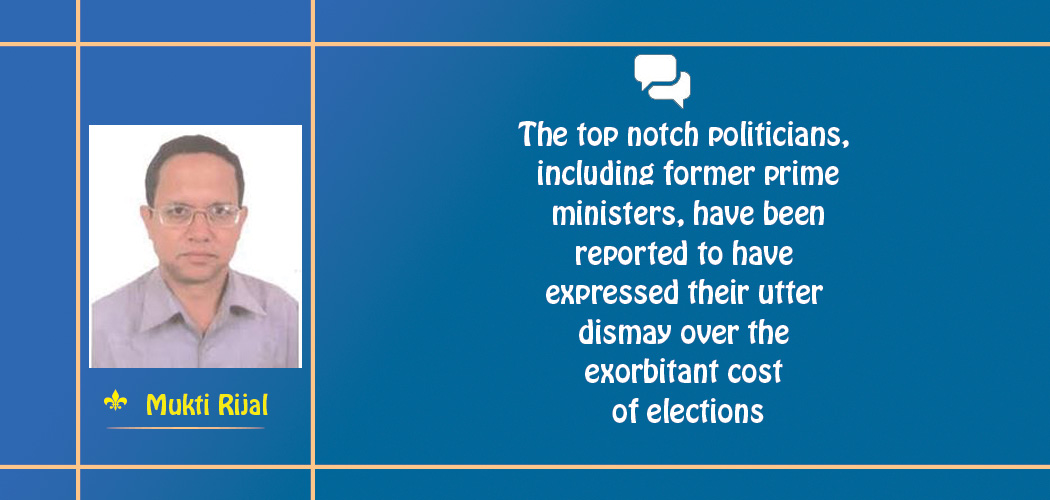- Friday, 27 February 2026
Curbing Monetary Muscle In Polls
Mukti Rijal
The prevalence of monetary muscle in politics has been an issue of growing concern worldwide. The countries, irrespective of their stages of developmentand institutionalisation of democracies, are all faced with the consequences arising out of the use and abuse of money in elections. A few months ago, South Africa had held local polls where a particular concern had been expressed over the misuse of the resources at the local polls. In the 2020 US presidential polls, the use of monetary muscle was at its worst manifestation. Nepal has not been an exception to it. The top notch politicians, including former prime ministers, have been reported to have expressed their utter dismay over the exorbitant cost of elections even though they have to molest and manipulate the figures and file their returns to the Election Commission swearing that they have not breached the expenditure ceiling fixed by the constitutional entity.
Systemic corrosion
As the country is ready to hold elections for the local governments – rural municipalities and municipalities – during the second week of the next month, the subject of paramount attention and concern has been the issues associated with poll campaign financing. The EC appears rightly to have focused its attention on minimising the influence of monetary muscle in the determination of the outcome in the upcoming electoral exercise. Chief Election Commissioner Dinesh Thapaliya has expressed his determination to initiate and enforce stronger action against those breaching the norms of the expenses ceiling fixed by the election body. He has also sought cooperation from media, civil society organisation and other stakeholders in reining in the distortions and systemic corrosion being engendered due to the unbridled use of monetary muscle in the elections.
When it comes to the discussion about the need to rationalise and control the use of illicit money at the elections, the discourse of the US presidential candidate senator Elizabeth Warren who had dropped out from the race before the national convention of the Democratic Party is worth to reiterate here at length. Warren is an American politician and former law professor who has been the senior US senator from Massachusetts serving since 2013. A member of the Democratic Party and regarded as a progressive, she was a candidate in the 2020 Democratic Party presidential primaries ultimately finishing third trailing behind Joe Biden and Bernie Sanders.
Warren in her commitment for election reform had remarked: "Whatever issue brings you to politics - whether it’s climate change or gun violence, student loans or drug prices - there is a reason why our country hasn’t been able to make progress has been the menace of corruption. Money slithers through every part of our political system, corrupting democracy and taking power away from the people. She adds, "Big companies and billionaires spend millions to push Congress to adopt or block legislation. If they fail, they turn to lobbying federal agencies that are issuing regulations. And if they fail yet again, they run to judges in the courts to block those regulations from taking effect." Though she was referring to the situation in the US, this observation echoes the state of corruption and challenges it has posed to the growth and development of democracy in Nepal.
In the US, according to the US Senator, before the legislative process even starts, lobbyists and billionaires try to buy off politicians during elections. Candidates and elected officials often spend hours and hours a day doing call time with big donors. Instead of learning about policy and working for their constituents, they jet across the country, going from one closed-door fundraiser to another, hearing about the woes and challenges of being a billionaire or corporate CEO.
Highlighting that the use of monetary power begets the corruption and destruction of democracy, she emphasised on the need to get big money out of politics. She pledged: "In my campaign, I have made a commitment not to take money from federal lobbyists or donors of any kind, not to take contributions over $200 from fossil fuel companies or big pharma executives and not to give ambassadorships to wealthy donors or bundlers. And I’m not doing call time with rich donors or giving special access to rich people in exchange for contributions to my campaign." She further said, "My campaign is and will continue to be a grassroots campaign - funded by working people chipping in a few bucks here or there. I will ban corporate contributions to our Convention and direct the Democratic National Committee to return to the Obama standard and reject lobbyist and donated money."
She made a fervent appeal. "That’s why I am also calling on every candidate in this race to disclose any donor or fundraiser who has a special title on their campaign, including national and regional finance committee members and designations, and to disclose the dates and locations of their fundraising events and the names of every person who appears on a host committee on invitations tied to those events. "Of course, voluntary changes aren’t going to be enough to clean up corruption in our elections. That’s why when I’m president I will implement a comprehensive plan to permanently eliminate big money from our politics and return it to the people," she states.
Poll ethic
As pledged in Elizabeth Warren's presidential race commitment made public in 2020, a comprehensive election reform plan should be worked out in Nepal, too, to curb the use of monetary muscle in elections. The EC, according to news reports, seems to have laid focus on fighting the malaises seen in campaign financing in Nepal, too. There is also a need for the candidates to uphold ground norms of electoral ethic and integrity and make commitment that they are not going to use money and muscle power in polls.
(The author is presently associated with Policy Research Institute (PRI) as a senior research fellow. rijalmukti@gmail.com)















